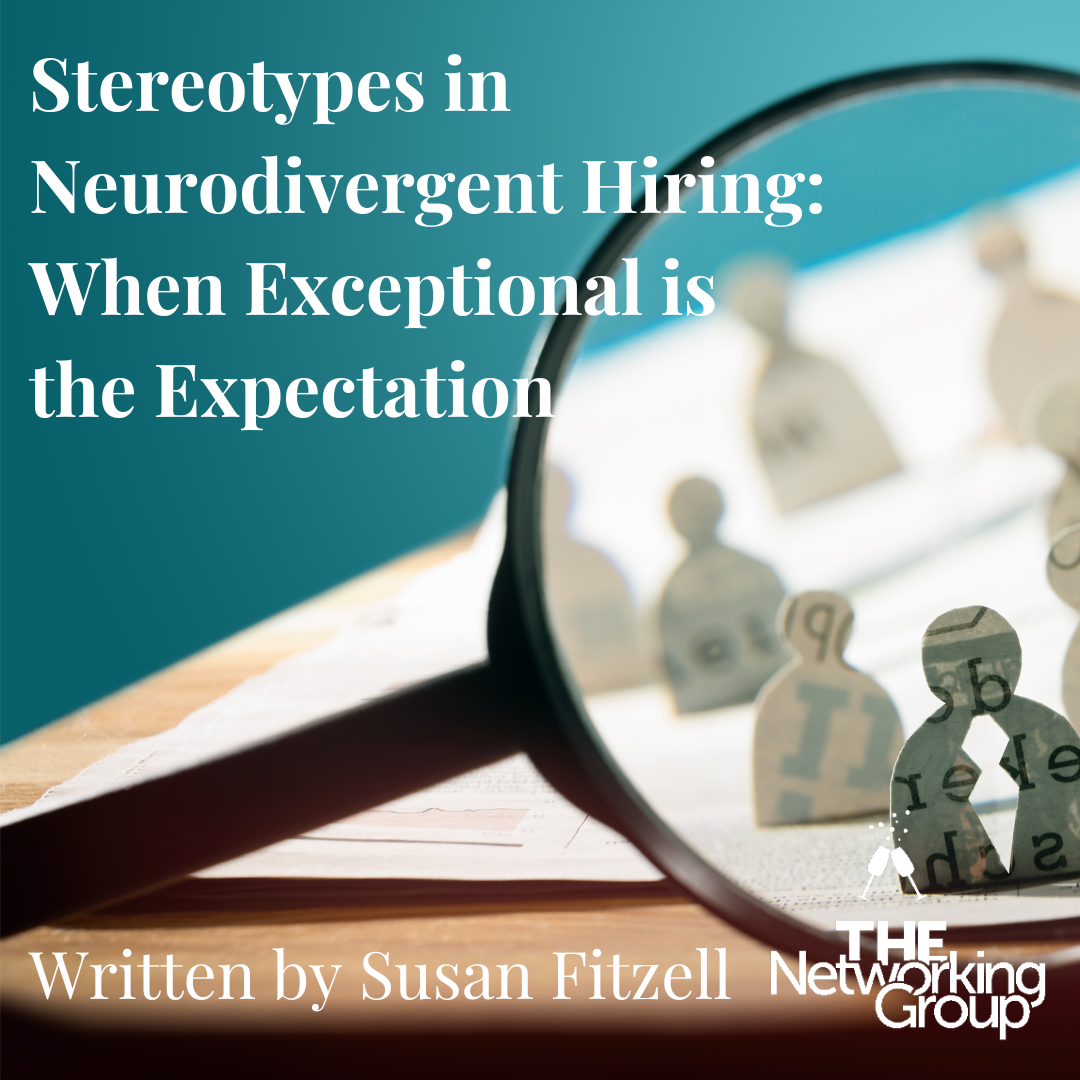Stereotypes in Neurodivergent Hiring: When Exceptional is the Expectation
Written by Susan Fitzell
For all the acceptance that neurodivergence has been receiving, including workplace initiatives to recruit and train neurodivergent talent, we still have a long way to go to attain equity and full inclusion. Stereotypes still impact hiring patterns. Hiring practices are standardized around these stereotypes.
 I am guilty of espousing the idea that neurodiversity is a competitive advantage. I’ve quoted corporate studies confirming the belief that having neurodiverse teams fuels innovation.
I am guilty of espousing the idea that neurodiversity is a competitive advantage. I’ve quoted corporate studies confirming the belief that having neurodiverse teams fuels innovation.
I also believe that each human has unique gifts that can be described as superpowers. Yet, there is much concern about a “superpower’’ stereotype emerging in the world of neurodiversity. This superpower descriptor is most common when considering those on the autism spectrum. It’s time that concerns about stereotyping people with autism and other neurodivergence are brought into the open for discussion.
When neurodiversity hiring initiatives are pitched and accepted, there’s often an assumption that candidates will primarily be people with autism — and those candidates will be savants and nothing less. Furthermore, it is often believed that neurodivergent hires will assimilate into a neurotypical working environment, which is not friendly to neurodiversity. They must also exceed all expectations while exhibiting capabilities that may be deemed “beyond human.”
This superhuman expectation is particularly pronounced in the approach of many corporate workplaces toward autism. Our natural tendency to embrace stereotypes about people different from us hamstrings hiring initiatives. Today, despite the high demand for workers in every industry, 75% to 85% of adults with autism are unemployed globally — a number that hasn’t moved since the last major studies were published in 2017 (Heasman, 2017). A 2021 study by the UK’s Office of National Statistics found that people with autism experience some of the highest unemployment rates in that country.
At a time when Elon Musk celebrates his foray into outer space, we would do well to consider what the idealization of successful autistic outliers has done to the big picture of neurodivergence and those who live with it. More than one autistic colleague has implored me not to use Elon Musk, Bill Gates, or Temple Grandin as examples of neurodivergent success. Stereotypes that set the expectation that neurodivergents are supposed to be savants or genius outliers are detrimental and affect their sense of self-worth. At its worst, the phenomenon results in what is known as autism masking (Pearson and Rose, 2021), a coping mechanism that can, over time, seriously affect mental and physical health.
What can be considered an acceptable presentation of neurodivergence and what cannot?
Organizations trying to define this may make an arbitrary decision. When decision-making doesn’t include neurodivergent people in the discussion circle, the result is that standards are set so that presumed exceptional attributes become the norm. Often, corporate narratives are rooted in societal misconceptions. They tend to tokenize inclusion.
Well-respected platforms often depict neurodivergence as a competitive advantage. They base their argument on neurodivergent employees’ extraordinary mathematical abilities or software development skills. This tendency to focus on ‘superpowers’ sets unrealistic expectations. Rather than fostering an equitable space, these narratives turn the tables on truth. They manifest in people seeing the traditionally “othered” community as a privileged one with superpowers. Such blatant denial of reality can create a façade of inclusion and diversity in corporate workplaces.
Much of the stereotyping and idolization of “superpowers” among autistic individuals stem from the images portrayed in pop culture (Draaisma, 2009).
These stereotypes stem from movies like Rain Man, one of the first films to attempt to shed light on neurodivergence. While Rain Man may have been revolutionary in presenting a subject as sensitive and tricky as autism on screen, the movie still fell short, relying on the main character’s savant syndrome to move the plot along.
But that was 30 years ago. Perhaps society’s perceptions have changed. Let’s look at the past decade of neurodivergent representation in the media. The most prominent example of neurodivergent individuals portrayed in pop culture is Sheldon Cooper, the physics prodigy with above-and-beyond intelligence embodied in one white male celebrated as an eccentric. His quirky demeanor is played for laughs in The Big Bang Theory and its spinoff, Young Sheldon. More recently, The Good Doctor features a main character who is an autistic savant solving medical dilemmas.
Is neurodivergence only legitimized when there is an exceptional talent?
Revamping our hiring practices
Generalizing the entire neurodivergent populace under one umbrella does little to remove the stereotypes that guide most human resource (HR) decisions. Hiring practices that see the neurodivergent picture in black and white alone leave neurodivergent candidates with the same recurring issue; to be inducted into a neurotypical society, one needs to successfully camouflage their neurodivergence (masking, or autistic masking) or somehow transform into a savant with extraordinary capabilities.
Pop culture paints images of neurodivergence that promote extraordinary abilities as the only acceptable form of talent in the neurodivergent community.
This critique of savant syndrome is in no way advocating for lower expectations when hiring. Instead, it’s a call for awareness. Be aware of the stereotypes that do not serve organizations that seek to build a diverse, equitable, and inclusive workplace.
References:
Austin, R.D., and Pisano, G.P. (2017, June). Neurodiversity as a Competitive Advantage. Harvard Business Review. https://hbr.org/2017/05/neurodiversity-as-a-competitive-advantage
Draaisma D. (2009). Stereotypes of autism. Philosophical transactions of the Royal Society of London. Series B, Biological sciences, 364(1522), 1475–1480. https://doi.org/10.1098/rstb.2008.0324
Heasman, B. (2017, August 10). Employers may discriminate against autism without realising. London School of Economics Blogs. https://blogs.lse.ac.uk/equityDiversityInclusion/2017/08/employers-may-discriminate-against-autism-without-realising/
Pearson, A. and Rose, K. (2021, March 18). A Conceptual Analysis of Autistic Masking: Understanding the Narrative of Stigma and the Illusion of Choice. Autism in Adulthood, 3(1), 52–60. https://doi.org/10.1089/aut.2020.0043
Copyright © 2022 Susan Fitzell & Aim Hi Educational Programs, LLC. First published June 20, 2022.

